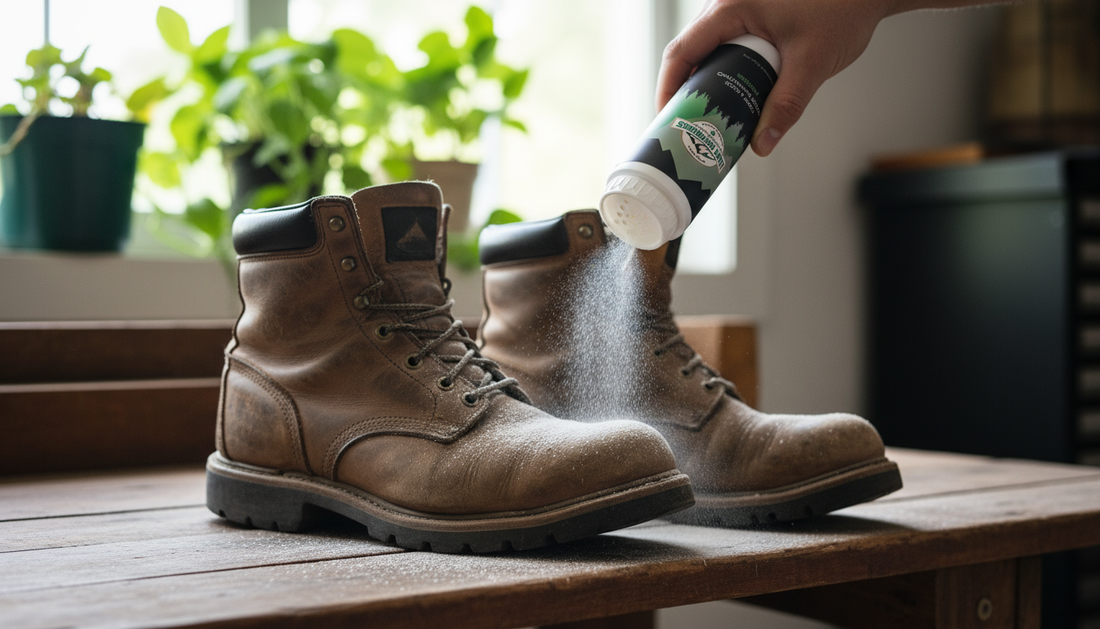
How to Get Smell Out of Work Boots: Ultimate Guide
Share
Hey there, if you've ever kicked off your work boots at the end of a long day only to be hit with a wave of that not-so-fresh scent, you're not alone. I've been there—standing in the mudroom after a tough shift, wondering why my trusty boots are betraying me like that. It's frustrating, right? But here's the good news: you can tackle that stubborn smell head-on with some straightforward steps. As someone who's helped countless folks freshen up their gear, I'm sharing everything you need to know to get your work boots smelling like new again.
Key Takeaways
- Combine washing with natural deodorizers for the best results in eliminating boot odors.
- Prevention starts with moisture control—use powders and sprays daily to keep smells at bay.
- Our recommended natural products provide a safe, effective system for long-lasting freshness.
Washing vs. Deodorizing: Quick Comparison
| Method | Best For | Frequency | Tools Needed |
|---|---|---|---|
| Washing | Removing dirt and surface grime | Every 1-2 weeks | |
| Deodorizing | Neutralizing bacteria and odors | After every use |
>Table of Contents
- Why Do Work Boots Develop That Persistent Smell?
- How to Wash Work Boots Effectively
- Best Ways to Deodorize Work Boots
- Long-Term Prevention Strategies
- Expert's Toolkit: Recommended Resources
- Frequently Asked Questions
Why Do Work Boots Develop That Persistent Smell?
Picture this: you're out on the job site, sweat building up inside those heavy-duty boots, trapping moisture like a sponge. That's the perfect breeding ground for bacteria, and before you know it, your boots are carrying around that funky aroma. It's not just sweat—dirt, grime, and even leftover lunch crumbs can contribute. Have you noticed how the smell seems to linger no matter what? That's because the bacteria thrive in dark, damp spots, multiplying and releasing those odor compounds.
Work boots take a beating compared to sneakers. Leather or synthetic materials hold onto smells tighter, and if you're in construction, farming, or any outdoor gig, you're dealing with extra humidity and debris. I remember helping a buddy who works in landscaping; his boots were so bad, the whole truck cab smelled. The key? Understanding it's not the boot's fault—it's the buildup. By addressing the root causes, like excess moisture and bacteria, you can stop the cycle.
Don't worry, though. With the right approach, you'll reclaim that fresh-out-of-the-box feel. Let's dive into the washing basics first.
How to Wash Work Boots Effectively
Washing is your first line of defense against that built-up grime causing the smell. But skip the washing machine unless your boots are specifically made for it—most rugged pairs aren't. Instead, focus on hand-cleaning to avoid damage. Start by removing the insoles if possible; they're often the biggest culprits.
Step-by-Step Washing Guide
- Prep Your Space: Grab a basin or tub, mild soap (like dish soap), and a soft brush. Work outside or in a well-ventilated area to let things air out.
- Knock Off Loose Dirt: Use a dry brush to remove mud and debris. This prevents clogs in the cleaning process.
- Soap It Up: Mix warm water with a squirt of soap. Dip the brush and scrub the exterior, paying extra attention to seams and soles. For insides, use a cloth to wipe down.
- Rinse Thoroughly: Hose off or rinse with clean water. No soap residue means less chance for new smells to form.
- Dry Properly: Stuff with newspaper and let air-dry away from direct heat. Sunlight helps kill bacteria naturally—aim for a sunny spot if possible.
Do this every couple of weeks, or more if you're in wet conditions. I once had a pair that sat damp for days after a rainstorm; washing saved them from the trash. Pro tip: For leather boots, condition after drying to keep them supple.
If you're dealing with canvas or nylon, a gentle machine cycle on cold might work, but always check the label. And hey, if washing alone doesn't cut it, that's where deodorizing comes in.
This stuff is pretty amazing - is killing whatever was living in my son's work boots !!!! We thank you and all that work with him than you !!!
Best Ways to
Remove Insoles and Brush Off Dirt
Take out removable parts and clear loose debris to prepare for deep cleaning.
Scrub with Mild Soap Solution
Use a soft brush and soapy water to clean interiors and exteriors thoroughly.
Rinse and Air Dry
Flush away residue and dry naturally to kill bacteria with air circulation.
Deodorize Work Boots
Once they're clean, it's time to neutralize that lingering odor. Deodorizing targets the bacteria directly, not just masking the smell. Natural options are my go-to—they're safe for your skin and the environment. Let's break down some effective methods.

Natural Deodorizing Techniques
- Baking Soda Power: Sprinkle a generous amount inside overnight. It absorbs moisture and odors like a champ. Shake out in the morning—your boots will thank you.
- Vinegar Spray: Mix equal parts white vinegar and water in a spray bottle. Mist the insides and let dry. The acidity kills bacteria without harsh chemicals. Smells vinegary at first, but it fades to fresh.
- Essential Oil Blends: A few drops of tea tree or lemon eucalyptus oil on a cloth, wiped inside. These have natural properties that fight odor-causing microbes. Just dilute to avoid staining.
For tougher cases, like boots that see daily sweat, reach for specialized products. Our Natural Extra Strength Lemon Eucalyptus Shoe Deodorizer Spray is a game-changer. Spray it in at night, and wake up to boots that smell citrusy clean. It's plant-based, so no worries about fumes around the house.
✅ Do: Deodorize after every wash and before storing.
❌ Don't: Overdo sprays— a little goes a long way to avoid residue.
I've seen folks swear by freezing boots overnight in a bag to kill bacteria with cold, but combine it with these for best results. What about you—tried any home remedies that worked wonders?
I was working 12 hours almost every day..where my feet would sweat and start to smell (which never use to be a problem) Since Ive purchased this product I dont sweat at all and my feet smell like lemon all day. Definitely a smart and great buy.
Long-Term Prevention Strategies
Why wait for the smell to hit when you can stop it in its tracks? Prevention is easier than cure, especially for work boots that get heavy use. Focus on keeping things dry and breathable.

Daily Habits for Fresh Boots
- Rotate Your Pairs: Give boots a day off to air out. Alternate two pairs if you can—it's like a mini-vacation for your feet.
- Moisture Control: Use absorbent insoles or powders to wick away sweat. Sprinkle natural foot powder in before wearing; it creates a barrier against dampness.
- Proper Storage: Keep boots in a cool, dry place. Avoid stuffing them in a damp locker—use cedar blocks for extra freshness.
- Foot Care Routine: Wash your feet daily and opt for moisture-wicking socks. Cotton breathes better than synthetics in hot conditions.
For those extra-sweaty days, our Natural Foot Powder is perfect. Talc-free and made with lemongrass, it keeps feet dry without clumping. Apply to feet or boots in the morning, and you're set.
Check out our article on Best Foot Powder for Sweaty Feet: Ultimate Guide for more tips. And if tea tree sounds familiar, read about Tea Tree Oil for Shoe Odor—it's a natural powerhouse.
One more link: If sensitivity is an issue, see Gentle Freshness: Best Shoe Deodorizers for Sensitive Skin. Small changes like these make a big difference over time.
Expert's Toolkit: Recommended Resources
As your go-to for boot freshness, I wouldn't leave you without my top picks. These aren't just any products—they're designed for tough odors like those in work boots.
First, the Lumi Outdoors Shoe Deodorizer Bundle. It's the ultimate combo: a natural spray for reactive odor busting and powder for proactive moisture control. Why recommend it? Because work boots need both— the spray tackles existing smells overnight, while the powder prevents new ones by absorbing sweat. Perfect for long shifts; users love how it synergizes for total protection. At a bundle price, it's smart value for anyone stacking solutions.
For severe cases, grab the Extra Strength Lemon Eucalyptus Spray I mentioned earlier. Its potent enzymes destroy bacteria at the source, safe for family use. And don't forget the powder standalone if prevention is your focus—silky, natural, and effective all day.
These tools, paired with the steps above, will keep your boots fresh. Trust me, once you try them, you'll wonder how you managed without.
I took a chance on this because I didnt think anything would help with foot odor in my shoes. Well, this is well worth the money because for the first time in my life I can actually come home from work and take off my shoes without having to clean my feet. Its truly amazing. I have been waiting for my feet to build up a tolerance and go back to the way they have always been but after 6 months of using this powder across a wide range of shoes, mostly without socks, my feet are still fresh at the end of the day.I fully recommend this powder.
Frequently Asked Questions
How Often Should I Wash My Work Boots?
Aim for every two weeks, or weekly if they're caked in mud. Regular cleaning prevents odor buildup.
Can I Use Regular Lysol on Work Boots?
It's okay in a pinch, but natural alternatives are gentler on materials and safer for daily use around kids or pets.
What If My Boots Are Leather—Will Deodorizers Damage Them?
No, plant-based sprays like lemon eucalyptus are safe. Test a small spot first, and condition leather afterward.
Do Odor Balls or Stuffers Really Work?
They help absorb moisture, but for full elimination, combine with sprays or powders for better results.
How Do I Prevent Odor in Wet Conditions?
Use waterproof treatments and dry thoroughly after exposure. Powders help too—apply liberally before rainy shifts.
Wrapping it up, getting the smell out of your work boots doesn't have to be a chore. From thorough washing to smart prevention, these steps will have you stepping confidently. Remember, consistency is key—stick with it, and your boots (and nose) will love you for it. Got more questions? Drop a comment below.
